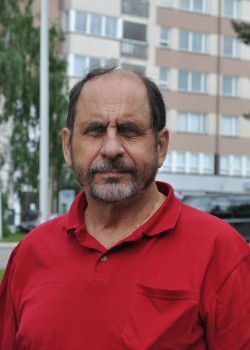Joni Skiftesvik: arctic storyteller
Issue 4/1984 | Archives online, Authors, Interviews

Joni Skiftesvik. Photo: Hilkka Skiftesvik
Olavi Jama interviews Joni Skiftesvik
We’re sitting on the fringes of the arctic zone, in the modern centre of Oulu, a town that built its wealth in the last century on tar export and sailing ships.
In front of us is the sea; behind us curves Oulujoki, the river that has for centuries brought Oulu writers stories from the north. The restaurant is filled with the bright light of midday; we want to see each other clearly.
JS: All summer the wind blows in from the sea. Now there’s a land wind. It comes from the east.
OJ: You’ve published only two books, but you’re hardly a typical debutant writer. All day you work for an Oulu publisher of romantic fiction, whose products attract hundreds of thousands of readers every year. What’s your job there?
JS: Publications director.
OJ: You returned from the Frankfurt Book Fair yesterday. Did you see anything there to interest you as an author?
JS: For a novelist or a short story writer, for a writer concerned with literature it was really quite a depressing sight. Long corridors and exhibition shelves by the kilometre.
OJ: Your volume of short stories, Puhalluskukkapoika ja taivaankorjaaja (‘The blow-flower boy and the heaven-fixer’) appeared last year. Your second book, Pystyyn haudattu (‘Buried standing’) has just come into the shops. Why a novel?
JS: I’ve been a journalist for over ten years, and during that time I gradually learned how to write short stories. I have an immense amount of material that I could turn into more short stories. But I wanted to try something more difficult.
OJ: In your short story The blow-flower boy and the heaven-fixer you mention Petsamo and Europe in the same breath; there’s something cosmopolitan about you, and at the same time a great deal of the traditional Finnish writer. You write about the common people. Like many Finnish novelists before you, you are very conscious of the gap between rich and poor in this world.
JS: As a child I was always curious, over-curious, about my surroundings, and I still find characters, real Finnish characters, in my childhood landscapes of ports and ships. My father, Otto Olof Skiftesvk, is a sea captain from Bergen. I was born in Norway and lived there, too, for a short while. My mother is a dock worker from Oulu. I’m interested in the people who live on the shores of northern Europe, and in how they make their living.
OJ: All the same, it’s difficult to see you as a traditional realist.
JS: Yes, I don’t really believe that you have to take a story and just tell it from the beginning to end. My subjects may be the same as Pentti Haanpää’s, with the same lumberjacks and tramps, but it’s the different structure of the story that gives the text its character – the use of hints and sudden cuts between scenes, action taking place simultaneously on a number of different levels…
OJ: Must a writer concern himself with social problems?
JS: I do think it’s wrong to try to write of society as class-structured.
OJ: So the writer isn’t like the harbour boss Korpela in Pystyyn haudattu, sorting people out into the sheep and the goats, according to his own whims?
JS: Of course not. The job of the writer is to demonstrate that there are good people and bad people in every class of society. I take my characters out of the group or the crowd and draw a close-up portrait. In such portraits the working class doesn’t emerge as any more honest or admirable than any other.
OJ: I’d say you’re quite a psychologist. In connection with your new novel, you have been compared with another writer from the north of Finland: Timo K. Mukka, who died in Rovaniemi in 1973. What’s your reaction?
JS: There’s only one thing to say. It’s a great honour.
OJ: It’s been said that Pystyyn haudattu is a ballad like Mukka’s well-known novel Maa on syntinen laulu (‘The earth is a sinful song’, 1964). Do you yourself see any other parallels between yourself and Mukka?
JS: There are certainly some similarities in our backgrounds. Ordinary folk living far from cities, Slavic melancholy, a strong taste of blood… When we live, we live strongly and powerfully.
OJ: You’re about to set off for South America, for Argentina, to write. Why?
JS: For once I shall be able to combine two things: writing and a long sea voyage.
I peer past Joni Skiftesvik – the sea I’d expected to glimpse isn’t there; only the old fishing village of Pikisaari. Its wooden houses are in sharp contrast to the concrete, glass and steel that the Oulu tar magnates have built around us.
Translated by Hildi Hawkins
Tags: short story
No comments for this entry yet
Leave a comment
-
About the writer
Olavi Jama (b. 1952 in Ylitornio, Lapland) is a freelance journalist, critic and poet. He has published three volumes of poetry and has written and edited non-fiction books as well.
© Writers and translators. Anyone wishing to make use of material published on this website should apply to the Editors.
